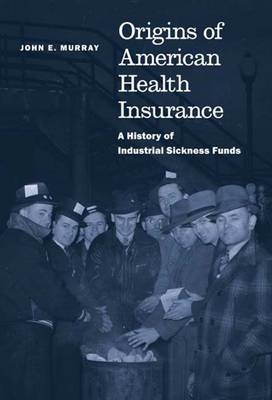
Origins of American Health Insurance
A History of Industrial Sickness Funds
Seiten
2007
Yale University Press (Verlag)
978-0-300-12091-2 (ISBN)
Yale University Press (Verlag)
978-0-300-12091-2 (ISBN)
- Titel z.Zt. nicht lieferbar
- Versandkostenfrei
- Auch auf Rechnung
- Artikel merken
How did the United States come to have its distinctive workplace-based health insurance system? This book explores the history of health insurance in the US from its roots in the 19th-century sickness funds offered by industrial employers and labour unions to the rise of group plans such as Blue Cross Blue Shield in the mid-twentieth century.
How did the United States come to have its distinctive workplace-based health insurance system? Why did Progressive initiatives to establish a government system fail? This book explores the history of health insurance in the United States from its roots in the nineteenth-century sickness funds offered by industrial employers, fraternal organizations, and labor unions to the rise of such group plans as Blue Cross and Blue Shield in the mid-twentieth century.
Historians generally view the failure to establish universal health insurance during the first half of the twentieth century as an indicator of the political clout of insurers, employers, unions, and physicians who thwarted Progressive efforts. But the explanation is actually simpler, John Murray contends in this book. Careful analysis of the workings of industrial sickness funds suggests that workers rejected plans for compulsory state insurance because they were largely content with existing private plans. Murray revises our understanding of the evolution of health care insurance in the United States and discusses the implications of that history for the ongoing debates of today.
How did the United States come to have its distinctive workplace-based health insurance system? Why did Progressive initiatives to establish a government system fail? This book explores the history of health insurance in the United States from its roots in the nineteenth-century sickness funds offered by industrial employers, fraternal organizations, and labor unions to the rise of such group plans as Blue Cross and Blue Shield in the mid-twentieth century.
Historians generally view the failure to establish universal health insurance during the first half of the twentieth century as an indicator of the political clout of insurers, employers, unions, and physicians who thwarted Progressive efforts. But the explanation is actually simpler, John Murray contends in this book. Careful analysis of the workings of industrial sickness funds suggests that workers rejected plans for compulsory state insurance because they were largely content with existing private plans. Murray revises our understanding of the evolution of health care insurance in the United States and discusses the implications of that history for the ongoing debates of today.
John E. Murray is professor of economics, University of Toledo. He lives in Toledo, OH.
| Erscheint lt. Verlag | 20.11.2007 |
|---|---|
| Reihe/Serie | Yale Series in Economic and Financial History |
| Zusatzinfo | 22 b-w illus. |
| Sprache | englisch |
| Maße | 156 x 235 mm |
| Gewicht | 635 g |
| Themenwelt | Medizin / Pharmazie ► Gesundheitswesen |
| Betriebswirtschaft / Management ► Spezielle Betriebswirtschaftslehre ► Versicherungsbetriebslehre | |
| ISBN-10 | 0-300-12091-5 / 0300120915 |
| ISBN-13 | 978-0-300-12091-2 / 9780300120912 |
| Zustand | Neuware |
| Haben Sie eine Frage zum Produkt? |
Mehr entdecken
aus dem Bereich
aus dem Bereich
Bedarfsanalyse, Vertrags-Check, Testsieger für jede Situation, …
Buch | Softcover (2024)
Stiftung Warentest (Verlag)
CHF 20,95


